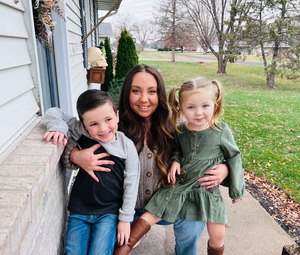How does one go about sharing their story of sexual abuse?
- Jordan Edwards

- Apr 13, 2020
- 4 min read

How does one go about sharing their story of sexual abuse? I don’t know. It’s weird, it’s uncomfortable, but I think it is important to talk about.
I've considered and then reconsidered whether this would be an appropriate topic to write about. My heart tells me that it is but then my mind starts talking me out of it.
I decided to listen to my heart. If I could touch one person, inspire one person, help heal one person, my vulnerability would be worth it.
When I was 5 years old, I was sexually abused. My perpetrator was 10 years older than me and he knew better. It happened one time and one time only. I distinctly remember it. I remember I made myself believe that it was a dream, that it wasn’t really happening. This is before I knew what mental health terms like disassociation meant. It wasn’t a dream. And I very much remember it. It was terrible, it was awful, it was not okay.
But do you know what was?
I was b e l i e v e d.
And that made all of the difference.
Every person in my life that loved me never doubted my truth. They made me feel safe. They told me that it wasn’t my fault. They protected me by putting in safety measures and ensured that I received the counseling I needed.
Bottom line, I knew I was loved, protected, and safe.
And those three things are the most profound factors involved in my resiliency.
For most of my life, I believed that this part of my story had very little impact on my well-being. When I thought about that night, I didn’t feel a thing. There was no sadness, no shame, and no hurt. I felt nothing. At different times in my life when I shared my story, it almost felt like I was telling someone else’s story, not my own. I know that sounds strange but I had this abnormal sense of “nothingness” around the entire situation. Maybe because my truth was already out there and I wasn’t holding it in? Maybe because I was believed? Maybe because my perpetrator no longer had to be a part of my life? I’m not sure. But nonetheless, it never caused me pain. Or so I thought.
Recently, my mom started cleaning her upstairs attic. She found my baby book, old photo albums, and old letters. She brought over some items for me to go through and check out. Tucked inside an old folder was a letter. The letter was addressed to my mom but being me, I decided to read it anyways. It was an apology letter dated 25 years ago. My perpetrator apologized to my mom for hurting me. The letter was halfhearted at best but I have to give him credit for at least owning up to his mistake. I remember hearing that the letter existed but I was never able to read it.
I finally got to. I read each word carefully. I studied every line. I processed his explanation. I looked at the situation through my mother's eyes, now that I am a mother myself. I saw things differently.
I took the apology for what it was. I never really needed one. I always felt validated by the fact that my truth was out there. But, the letter did bring me some closure. In a way that I didn’t know I needed.
What I can see now is that this part of my story did impact me. Trauma can manifest in a variety of ways. For me personally, after some deep self-reflection, and personal awareness, I realize I struggle with change, stress, and emotional regulation. I have never been good at handling change which I think triggers things like postpartum depression and anxiety. I have an unhealthy emotional relationship with food. I fear abandonment. I can be private (although you may be surprised based on the topic of this blog post), and I can be a people pleaser, fearful of hurting others and or speaking my truth.
I think its important to note that I feel no anger towards my perpetrator. I know that statistically, he was probably a victim himself. What I do fear is whether his behavior stopped with me.
Just to shed some light on some staggering statistics regarding sexual abuse, did you know that:
1. 25% of women in the United States report being sexually abused
2. 90% of child victims know their abuser
3. 95% of victims are telling the TRUTH when they report incidents of sexual abuse
Number 3 is an important one, read it again.
In my line of work, I unfortunately see the unimaginable. Sexual abuse is a common occurrence and has likely happened to someone you know and love. I have seen families rally around their child victim and families deny their victim's truth. The latter is likely the most detrimental thing you could ever do to someone.
The people in my life who believed me without question gave me the best fighting chance to overcome my own trauma. They trusted my truth. And being trusted moves mountains, heals the deepest of wounds, and instills the most important virtue: the ability to o v e r c o m e .
I'm always here to listen, if you need someone.
With love,
Jordan
There are studies






Comments